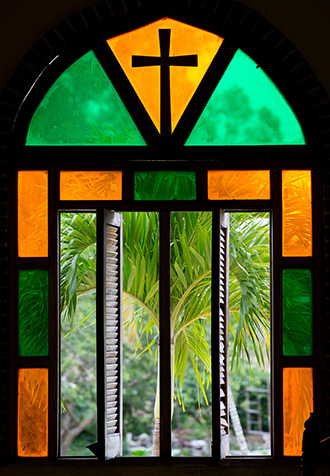When Rigoberto Figueroa visited his sister in Florida, he was perplexed by her neighborhood, where he rarely saw anyone on the streets.
It was quite a contrast to Havana neighborhoods, where people seem to know everyone and hear everything. “The thing about Cuba is we have learned to help one another – solidarity,” he explains. “Life here is very sociable.”
So while Figueroa — a member of Marianao Methodist Church and vice rector of the Havana seminary — readily acknowledges that Cuba has problems and restrictions, he appreciates the island’s lifestyle.
Singing the spirit in Cuba
Special report on the Methodist Church in Cuba.

The camaraderie found in Methodist congregations is a key aspect of the faith. After Figueroa, a former Roman Catholic, decided to join the Methodist Church in Cuba, his experience with members his own age through fellowship outside worship was important, he says. “You start to grow and mature. You discover your calling.”
On a national level, Camp Canaan, near Santa Clara, has served as a gathering place for numerous groups in the church. Methodist women hold two conferences a year there so that all can attend.
Evangelism includes social outreach — visits to hospitals, donations of clothing and supplies to meet community needs and, increasingly, engaging in disaster relief.
In November, during his sermon at Marianao Church, Bishop Ricardo Pereira showed a video of the first tour of the areas affected by Hurricane Matthew, which struck eastern Cuba the previous month.
Aid was distributed to Methodist pastors for relief work and the bishop said $20,000 had been raised so far to support the work in places like Guantánamo and Baracoa. “The churches in Cuba felt the pain of their brothers and sisters in Guantánamo.”
It wasn’t the church’s first involvement with hurricane relief. Close collaboration with the United Methodist Committee on Relief following Hurricane Sandy in 2012 resulted in that agency’s first disaster relief grants to the Methodist Church in Cuba to rebuild 100 homes and repair or rebuild 21 churches. Area churches assembled volunteer construction teams to do the work.
Bloom is a United Methodist News Service multimedia reporter based in New York. She and UMNS Photographer Mike DuBose visited Cuba in November. Follow her at https://twitter.com/umcscribe or contact her at 615-742-5470 or [email protected]
Like what you're reading? Support the ministry of UM News! Your support ensures the latest denominational news, dynamic stories and informative articles will continue to connect our global community. Make a tax-deductible donation at ResourceUMC.org/GiveUMCom.




